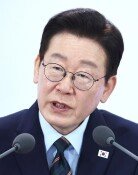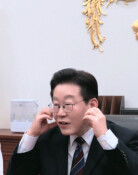[Editorial] Urging Democracy in North Korea
[Editorial] Urging Democracy in North Korea
Posted August. 10, 2009 08:21,
Hwang Jang-yeop, former secretary of the North Korean Workers Party and once the No. 2 man in Pyongyangs power hierarchy, has begun urging democracy and reform in the North. Defecting to South Korea 12 years ago, Hwang visited The Dong-A Ilbos headquarters Friday, his first visit to a media office since his arrival in the South. He told reporters about the human rights situation in the North, its leader Kim Jong Ils diplomatic strategy, and countermeasures against it. Hwangs comments deserve close attention in that he knows both Koreas well.
Hwang called the Norths communist regime a traitor government that starved millions of its people to death, turned the whole country into a prison camp, and forced countless of North Korean defectors to die violent deaths abroad. He said he learned from a briefing by a high-ranking North Korean official that 500,000 North Koreans, including 50,000 members of the Workers Party, died in 1995 from hunger, while one million starved to death in the first 11 months of the following year. Hwangs comment corroborates the rumor that 3.5 million North Koreans starved to death in the famine.
Though more than 10 percent of the Norths 24 million population died from hunger, Kim apparently feels no pang of conscience and shirks responsibility for this atrocity. The Norths second nuclear explosion and long-range missile tests conducted this year resulted in the suspension of international food aid, adding to the suffering of the North Korean people. The U.N. Food and Agricultural Organization warns that more than six million North Koreans will experience a food shortage until harvest season. If no action is taken, a large number of people will die from hunger. Turning a blind eye to the suffering of his people and those who fled the country, Kim is instead focusing on transferring power to his son.
To save North Koreans, who are our people in a non-liberated place, Hwang said the international community must distance itself from the North while pretending to respect it. By doing so, he said, the North can be isolated from the global community politically, ideologically and economically. He also criticized pro-North Korea groups in the South for unilaterally urging Seoul to resume talks with Pyongyang while blaming their government for strained inter-Korean relations. Hwang urged the need for non-governmental organizations and North Korean defectors to lead the movement to install democracy in the North.
In August last year, the Lee Myung-bak administration of South Korea allowed Hwang to travel abroad, write books, and give lectures. Because of this, he can now express his opinions, something that he could never have thought of doing under the two previous left-leaning governments in Seoul.



![[단독]폴란드, 韓 해군 최초 잠수함 ‘장보고함’ 무상 양도 안받기로](https://dimg.donga.com/c/138/175/90/1/wps/NEWS/IMAGE/2026/02/27/133437397.1.jpg)
![‘노인 냄새’ 씻으면 없어질까?…“목욕보다 식단이 더 중요”[노화설계]](https://dimg.donga.com/c/138/175/90/1/wps/NEWS/IMAGE/2026/02/27/133434557.3.jpg)


